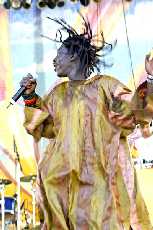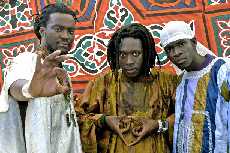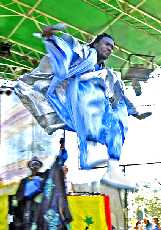Daara J means ‘school of life’ and for the three young men from Senegal (N’Dango D, Aladji Man and Faada Freddy) that make up this African/Ragga Hip-Hop group, consciousness and exposing the truths of the world are the most important aspects of their musical message.
Everyone in the United States correlates the roots of hip-hop as originating in the Bronx, New York, or the purists would go back farther to Jamaica in the West Indies. However, before any link can be made to hip-hop roots, one must always realize the roots to any black music form must be traced to the Motherland. That is naturally Daara J’s stance, and it’s not an arrogant one – they simply use it to showcase the essence from where all this unique tongue-twisting talents are derived. Although Daara J is very proud to ‘look up’ to all the hip-hop pioneers and stalwarts from America, the group addresses their lost brothers and sisters in America and the Black Diaspora who have been detached from their true African culture for the past 400 years.
Daara J, as the opening act to Mos Def and Femi Kuti, showed the Hollywood Bowl in Los Angeles an energy that left the crowd standing to their feet. Most opening acts seldom see such a response, but this KCRW’s World Festival Night show was an exception. The group performed new material from their American debut release, Boomerang (Wrasse), and frankly, it was plain to see that when Mos Def and Femi Kuti hit the stage sometime after, the concert line-up should have been in reverse – boomerang style.
 -With all the fruits of Africa – that being Black music in all its forms – you still find that African artists tend to get very overlooked. Is Daara J trying to reverse the scenario, hence the title of your LP, Boomerang?
-With all the fruits of Africa – that being Black music in all its forms – you still find that African artists tend to get very overlooked. Is Daara J trying to reverse the scenario, hence the title of your LP, Boomerang?
Faada Freddy: “What we’re trying to do is remind people that they should not forget about Africa. Africa’s been the mother of civilizations through Egypt. Even nowadays, American society is built and that’s because some Africans had to be involved in the slave trade on ships to come over here. So we want to bring more light to that. Nowadays people are tending to show the negative part of Africa but Africa is not only about AIDS, heartache, corruption and all that even though it exists just like everywhere else. But Africa has a lot to provide. ‘Africanity’ – Africanity for us means in ‘rootfulness’ and less stressed. We see many big societies, big skyscrapers, highly developed, while the population is stressed. But in Africa, even though we may not have the money, we have a good spirit of enjoying life. We keep a smile on our face – sometimes we’re up, sometimes we’re down, but that’s part of life. It’s that kind of philosophy we want to provide to people. Tell ’em that Africans – we strong inside, rather being [strong] outside and being weak inside, we prefer to be strong inside.”
-How long has your group been waiting for this ripe opportunity?
FF: “We’re been waiting for the opportunity for a long time because when we were kids, we used to listen to the hip-hop veterans such as Afrika Bambaata, Grand Master Flash & the Furious 5, Kool Herc, Public Enemy. The first time I heard lyrics like ‘don’t push me because I’m close to the edge’ (“The Message” by Grand Master Flash & the Furious 5), automatically the first thing I did was to turn those verses into my native language that was Wolof. And this made me realize hip-hop had no difference with out traditional POETIC music, which the griot ancestors used to pass on from father to son. It’s called ‘Tasso’. This ain’t no different from Tasso. The only difference is the backing-track; the American backing-track was computerized samples, drum boxes, stuff like that. While in our country, it used to be the clapping hands, feet beating on the ground and stuff like that. That’s why automatically I begin to realize that hip-hop was a part of our culture.”
-How’d you get in touch with hip-hop, way back in the late 1980’s being way over there in Senegal, Africa?
FF: “When you are from a poor corner, the Senegalese ghetto, you don’t really have much means, you don’t really have nobody to… you don’t really have information. We had some friends – middle class friends – that used to get stuff coming from all over like the United States. Because their parents were rich and used to travel, those boys used to tell their parents ‘bring me this, bring me that’. They brought back rap tapes. But as people, meaning ourselves, coming from a family of modest means, yuh know, we didn’t really have the opportunity. That though gave us the first touch of hip-hop music and then after, we just got involved and went to do the necessary footsteps ourselves to get more rap cassettes. We used to pirate it from the radio by recording it. That’s how we discovered a group like Das Efx. The funny thing about Das Efx is that the way they rhyme, is just like they were speaking Wolof. The flow was so African, it was so…so…so RUDE! …Automatically we adapted to that style trying to say over the Das Efx verses and stuff like that. Step by step, we got the flow, so this big revolutionary flow for us was Das Efx.”
FF: “It was very difficult at the same time because at that time when you wanted to incarnate such music as hip-hop, nobody would lend you the space to do it or give you space. They judged that this kind of music was kinda weird music and it was uprooted. And that’s why we weren’t allowed peacefully to incarnate that music. Whenever we wanted to do freestyle and stuff like that, people would just say ‘No! You can not do this because you gonna preach some gangster stuff here, you gonna preach some bling stuff, violence.’ But we really came a long way to finally give it back to hip-hop and show the people that hip-hop is more than preaching violence, more than bling bling, but it was a part of our culture. And slowly people got involved because of the heavy weight messages that we used to tell.
On the flip side of our travels now, outside of Senegal and Africa, it really made us change our mind about hip-hop, when you go here and there and meet different brothers, different ethnicities and colors, it made you realize the world is not only your street. Therefore any other youth on earth has the same aim to achieve – that aim is everybody is trying somehow to get self-fulfillment and to know who he is. Identity. That’s why we feel it’s necessary for many of our brothers living abroad, to remind them of the ‘Africanity’ – we believe that is where all the stories began. And we’re trying to build up the bridge that the slavery era has broken down. We trying to remind the brothers that here we are, we came a long way, we are the brothers that you’ve been separated from, from a long time. Thanks to that music called hip-hop, we have one international language.”
-Hip-Hop is just one of the many branches of the African musical expression amongst an array of other forms of music whether it be dancehall, soca, reggaeton, calypso, cumbia, etc. Why your gravitation towards hip-hop and not some other art form to express?
FF: “Yeah because hip-hop is one of the main music that created the melting pot musically. Hip-hop is like a platform in which anybody can incorporate and expose or impose his traditions, his own language and his own vision. Everybody will still have respect for him. Some people are reaching ‘Africanity,’ some people are preaching that they are Black Panthers, some people are preaching Americanism, whatever you wanna preach, hip-hop is wide open to your ideology. Hip-hop is just like, ‘OK guys you could do whatever you want with me, I’ll always be there for you’,” he laughs. That’s why it’s so meaningful to us.”
-Performing throughout the U.S., what has been the crowd responses to you as artists, but also to you as an introduction to African hip-hop?
FF: “People are interested in knowing Africa. A lot of them are even telling us that they’re concerned about Africa, but a lot of people don’t really make the footsteps necessary to go to Africa and see the reality. They just focus on what is told on TV. And nowadays, a lot of the information is falsified. And therefore it’s not helpful for the media to big up Africa – they just keep Africa on the low and show the negative part on the high. That’s why people are scared to go to Africa. But they should go… we corrupted in Africa, yes, but that’s because some leaders of the Western countries are trying to control. We have a story to tell, we count on this [music] we handling to make the people realize who they are. And it’s not finished, we still have a long way to achieve it.”
-I think for Americans in general, it’s hard to believe 3 guys from some far away country like Senegal, can reinterpret their hip-hop in any way to be taken seriously. How do you dispel that myth that foreign hip-hop is just ‘experimental’ or ‘irrelevant’ to humankind?
FF: “People have to know that when we came over here, the music that we bringing supposed to be the ancestor of this hip-hop music. This ain’t no joke, this is where it ALL began. And the way we do it, the way we dance it, the way we flow on it – MUST remind them really of themselves. That’s how it should be. They really have to give respect to that. They have to respect what we are doing.”
-So in other words, the best way to get across your message – to the U.S. massive at least – is to remind them that when they are looking at Daara J, they are looking at themselves.
FF: “That’s it, that’s how it should be,” he confirms with a laugh.
-In Senegal, it’s called ‘Tasso’ yet in other parts of Africa, I’m sure oratory poetry may be called something else but is basically the same. Do you think just one African country, that being Senegal, can solely claim this direct link from ‘Tasso’ to hip-hop?
FF: “Wherever you go, the name is gonna change because it’s part of the African culture. Before, it used to be one Kingdom in Africa. Then after, the colonization came. People came who said they wanted to evangelize Africa. This is where a good part of our culture is being buried. Now, we dig it up. Hip-Hop is the full proof that you can rip somebody from his native land, then centuries after his own culture is gonna come out from his soul as to what he needs to express himself. That’s how rap music was born in America. People were fed up with the system that they were trying to apply on their people. They want to have their own culture. It’s going around the world – now we’re colonizing the world with hip-hop music! You know Moliere? Moliere is a famous French playwright, a big poet from France, he’s like the equivalent to Shakespeare for here. I believe if Moliere were alive still, he’d get a big baggy pants and walk down the street,” he laughs. “That’s reality.”
-Back home in Senegal, are you fueling a strong conscious hip-hop movement, despite the forceful influence and penetration of negative American hip-hop and rap that the youth are so prone to gravitate to?
FF: “Nowadays, the bling bling style spreads out like wild fire! Everybody wants to get a big ice over his neck, no matter the price. They all wanna pimp, even though they’re not. The thing is, I believe that, being from a poor country like Senegal, I prefer to bling my soul or my spirit, rather than anything outside of me. For me, I prefer to bling my soul! Bling my inside, my spirituality is stronger inside, so nobody can change me. I cannot live with poor people around me and have diamonds around my neck while someone is starving of hunger. It’s not within my spiritual capacity. If some people wanna preach that, I’m ah let them preach that, but the thing is, you have to care around you. We should watch our mouth, watch our philosophy, watch every footstep we’re making. This hip-hop is even more powerful than politics, that’s why we should take it seriously! That’s why we should be careful.”
Daara J’s latest release is entitled “Boomerang” [Wrasse Records, 2004]. It’s available online at Amazon.








0 comments
In praise of Daara J | The Long Way Home says:
May 16, 2013
[…] back to Africa, like a boomerang that has been thrown from the motherland and is back home.’ In another interview, the group explain that listening to American hip hop at an early age struck a chord with them as […]